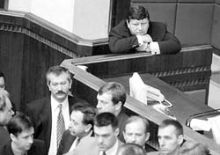The premier’s candidacy, agreed among Verkhovna Rada factions, could be submitted today. Or maybe not, as many point out ambiguously that the new premier could be appointed “before the end of the month.” The current intrigue was described by Speaker Ivan Pliushch at a press conference on May 20: “Kinakh and Tyhypko have been named as candidates but never presented in Parliament. It means that the President is not sure who will get the majority of votes in Verkhovna Rada.” SDPU(o) also leaves the final choice to Mr. Kuchma. “Our faction’s stand is that the president must make up his mind and name his candidate,” says Leonid Kravchuk.
Democratic Union leader Oleksandr Volkov believes that a deal will have to be made with the Left when forming the new cabinet. Evidence that the Premier saga is getting to be the overture to the next parliamentary election opera. During the parliamentary elections in 1998 and presidential campaign in 1999, the Communists played a role that was anything but minor, for which reason they attract special interest now. Ousting the Yushchenko government and looking for a new premier gives the Communists a chance to launch their own PR campaign. First, they can remind everybody interested to know that their party has numerically the strongest faction in the parliament. Second, they can now lash out at all those “oligarchic structures” all they want, snatching the laurels from Tymoshenko and Moroz. Be it as it may, every Ukrainian politician’s strength will be measured on the scale of his/her ability to resist or come to terms with the Reds.
Prior to Yushchenko’s fall, the Communist faction looked very much like a preserve of orthodoxy. After pushing themselves away from the Center, the Right had inadvertently tipped the balance of Ukrainian politics leftward. “It is practically impossible to ignore what the Communists decide to do,” declares KPU fraction member Heorhy Kriuchkov. True, he believes that the Communist views will have real weight if “the President really wants to get his premier through parliament.” He also believes that it could well come to the appointment of an acting premier and that it will not serve the lawmakers’ interest to let the premier saga fall into the hands of the Presidential Administration. Thus the interest in the goings on at the Red camp will increase with each passing day. The Communists, in turn, are doing their best — quite professionally, I would say — to stimulate this interest. Comrade Kriuchkov predicts that the Communist Party will be content to have a premier “not affiliated to any of the oligarchic clans, an honest and decent person capable of taking constructive steps,” and that “such persons can be found also outside the CPU faction.” Premier Yushchenko was unacceptable to them from the outset, for “Yushchenko led reform to absurdity, outdoing Kashpirovsky and Chumak in certain respects.”
As for the parliamentary majority falling apart very conveniently for the Communists, the Leninist party has nothing to do with it whatsoever, for it all was “triggered by the formation of pro-presidential and pro-government factions within that majority,” declares Speaker Ivan Pliushch, adding that for both premiership contenders (Anatoly Kinakh and Serhiy Tyhypko) would do best to work out some kind of deal between them; if they do not, “we will have to come to terms with a third force, the Communists.”
The “third force” meanwhile does not show too much resolution (at least in terms of naming candidates). Petro Symonenko says the Communist Party will decide “after the president identifies his candidate.” He also believes that “the president is acting in keeping with the acting premier scenario.”
The United Social Democratic faction looks more optimistic. First Vice Speaker Viktor Medvedchuk says that the parliament will name its candidate in the next couple of days. “Verkhovna Rada can and must come to terms,” he declares, stressing that Ukraine needs a prime minister, not an acting premier, and that this is something all factions, Left, Right and Center, must understand. In his opinion, both candidates — Kinakh and Tyhypko — could be prime ministers, yet he does not rule out the possibility of a third candidate.
Hence, the Red vector is not that strong, at least not stronger than the president’s one, and the latter has to make its stand clear today.







